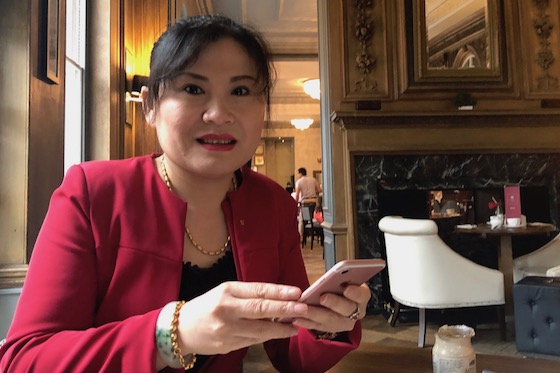“I get much more satisfaction from running a 212-room hotel than being an electrical engineer, though that training certainly comes in useful,” admits Kim Tian, hotel manager of The Bailey’s Hotel London.
The hotel, across the street from London’s Gloucester Road underground station, has as much character as its manager. It is named for its founder, James Bailey, who built it in 1876 as lodging for gentlefolk, and since 1994, when it was bought by Singapore-based CDL, it has been part of Millennium Hotels & Resorts.

Kim Tian is similarly a one-off. Mei zhi Tian – that’s her birth name – was born and brought up in Qinhuangdao, a port city in Hebei, 190 miles east of Beijing. As a child, she always knew her father expected his children eventually to take over the family’s chain of Chinese restaurants. “But I had other plans, and I studied electrical engineering at Singapore Changi Electronic Technology school,” she recalled.
Her life took another turn in 2000, when she went to London to visit her brother, and a friend found her a temporary job as a housekeeping maid at Bailey’s. “I really enjoyed housekeeping as I was able to make use of many of my skills and interests. In 2015 the entire five-floor property was being renovated, starting with the fifth floor, and the contractors allowed me to go in and give ideas for practicality. By the time renovations progressed down to the fourth floor, I had been promoted to executive head housekeeper and was given more and more contractual responsibility,” she said.
Promotion continued, taking her to director of operations and, as of April 1, hotel manager, exclusively responsible for the hotel and its 100-strong team, which includes 35 agency staff.
“My training means I remain especially interested in making sure all bedrooms work, and as simply as possible. I am concerned that everything is exactly where guests expect it to be and all is in working order,” she said. The hotel’s market is 66% leisure. Repeat factor is high, encouraged by the hotel’s location, and its immediate village-type retail, and, for Chinese guests, by a boss who speaks fluent Mandarin, which is surely unique among London hotels.
“I get at least three emails a day requesting me, personally, to make reservations. These regulars regard this as their London home – as do I. This is my life,” Tian declared.
She is generally in the hotel by 7:30 a.m. When she finally gets home, 25 minutes’ drive away, she has an Asian snack, usually kimchi, a typical Korean cabbage dish, before going to bed: Days off are for catching up on sleep, and relaxing in a sauna and steam bath.
This year, Bailey’s average occupancy should close at 80% with average stay of just under three nights, although many Middle East guests, who summer in London, stay several weeks (one family has just left after two months). Revenue is considerably boosted by the first-floor F&B, an open-plan pub-like bar that flows into an all-day Italian restaurant, Olives, with Italian chefs and managers. Despite its main entrance being via the lobby, Olives’ business is, apart from breakfast, about 75% locals rather than hotel guests.
“I love my life. I am fully supported by a complex GM who also oversees the neighboring Gloucester Hotel, another Millennium property, and by the corporate team, based in London,” Tian explained. Next on her agenda is to study revenue management, via distance learning out of the USA. Her parents still hope, however, that she will eventually move back home, to the family business.
